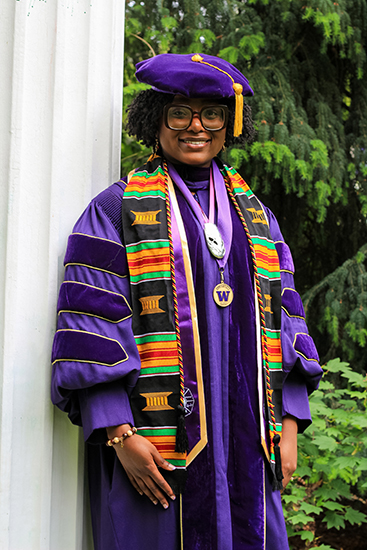By Julia Davis
July 31, 2024
Thelemaque has spent the past four years examining the impacts of slow-onset disasters on drinking water infrastructure in marginalized communities.

Nathalie Thelemaque in her graduation attire.
With the increasing threats posed by climate change and environmental degradation, the sustainability of critical infrastructure like drinking water systems is increasingly important.
Recent graduate Nathalie Thelemaque (CEE Ph.D. ‘24) has dedicated her work to understanding and addressing these challenges. Her doctoral research focused on how slow-onset disasters like climate change and the COVID-19 pandemic impact drinking water infrastructure in marginalized communities.
“It was always important, but these past few years have highlighted how crucial it is to study and address these issues comprehensively,” Thelemaque said.
Near the end of the spring quarter, Thelemaque was awarded the 2024 Graduate School Medal, which recognizes one UW graduate student whose academic expertise and social awareness demonstrate an exemplary commitment to the University and its larger community.
Creating sustainable water infrastructure for all
Thelemaque chose to study sustainability at a young age. She grew up in southern Florida, surrounded by bodies of water from the Everglades to the ocean. During her childhood, she witnessed the impacts of suburban sprawl and climate change firsthand in her community.
“I was in this beautiful environment where I could see how we as humans impact the environment. I saw sea levels rise and flood waters grow, which made me interested in sustainability very early on,” Thelemaque says.
Her doctoral research focused on how infrastructure systems could be designed and managed to better serve vulnerable populations during crises. She investigated how drinking water utilities plan, manage, operate and maintain their systems during slow-onset disasters and examined the implications for marginalized communities reliant on these infrastructures.
Slow-onset disasters are those that develop gradually over time, allowing for forewarning but often causing prolonged and significant impacts. Examples include climate change, which leads to rising sea levels and increased frequency of extreme weather events, and public health crises like the COVID-19 pandemic. These types of disasters can severely strain infrastructure systems, making it essential to understand how they affect vulnerable communities and to develop strategies for resilience and adaptation.
Thelemaque’s dissertation encompassed three major studies that addressed the challenges of drinking water infrastructure in marginalized communities facing these types of disasters. The studies looked at drinking water infrastructure at different levels — national, state and city — which Thelemaque weaved together in her final dissertation:
- COVID-19 impact on small and rural communities: This national-level study involved interviewing 26 utility operators and managers to understand their experiences providing water services during the COVID-19 lockdowns. Thelemaque found that many small water utilities struggled financially during this period.
“Some small water utilities found it very difficult to deal with the pandemic lockdowns because they had to stop bill payments to make things more accessible, but they didn’t have the financial reserves to back that up,” she explained.
This meant that while they were trying to help their customers by suspending bills, the utilities faced significant financial difficulties due to the loss of income.
- Water insecurity in Alaskan rural communities:
Focusing on the state level, this study examined the implementation of drinking water projects in rural Alaskan communities, particularly the logistical difficulties in maintaining and operating systems in remote areas. Using data from water infrastructure personnel and stakeholders in Alaska, she analyzed insights from local communities. In particular, Thelemaque noted the importance of community engagement in ensuring the sustainability of projects.
“A lot of the time folks just come in, put up a project and then leave, but making sure that community engagement is front and center ensures the projects can actually be maintained and sustained over time,” Thelemaque said.
- Impact of redlining on drinking water infrastructure in Seattle:
At the city level, Thelemaque investigated how historical redlining practices have led to disparities in infrastructure maintenance and service quality in Seattle. Her ongoing research found that areas previously redlined, or marked as “hazardous” for investment, tend to have more marginalized populations, especially Black communities.
“These areas have worse maintenance conditions and longer durations for repairs, which implies that the infrastructure service there is worse,” she said.
As a whole, Thelemaque’s research revealed that marginalized communities often face disparate impacts regarding drinking water infrastructure quality and service. Despite these challenges, these communities exhibit unique forms of resilience. Thelemaque’s thesis discusses the importance of increased financial support, mutual aid partnerships and targeted infrastructure investments to address these disparities.
Leadership and community engagement
Throughout her graduate student career, Thelemaque was an active leader in the Black Graduate Student Association (BGSA) and the Office of Graduate Student Equity & Excellence (GSEE), both of which she considers important parts of her community at the UW.
In the BGSA, Thelemaque created events and curated spaces where Black graduate students from various disciplines across the UW could meet and support each other. As part of GSEE, she served as an outreaching grad, helping to recruit students from marginalized backgrounds to graduate programs through mentorship opportunities, speaking on panels and other outreach activities. Thelemaque was also involved in A Vision for Engineering Literacy and Access, where she taught local students about sustainable engineering.
Looking ahead, Thelemaque is excited to continue her career in academia. She has accepted a position at the University of Massachusetts Amherst, where she will collaborate on research related to drinking water infrastructure in Alaska.
“During my Ph.D., I really enjoyed the teaching and mentorship aspects, and being able to help change how the next generation of civil engineers looks at situations and problems, and how they can incorporate sustainability and equity,” she said.